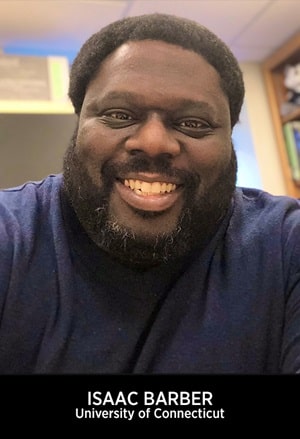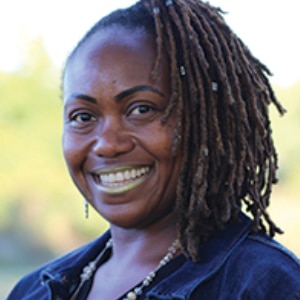Closing the Gap: Where Are They Now? …. With Connecticut’s Isaac Barber
This month we are featuring Isaac Barber, director for Student Union and Event Services at the University of Connecticut, who in 2020 participated in ACUI’s Closing the Gap program.
Isaac, tell us how you got your start in student affairs.
I am the product of an Air Force family, and we moved just about every three years. We went from Syracuse, New York, to California and then to England. After England, we headed back to New York and lived in Plattsburgh (near Canada). We finally ended up in northern Louisiana, where I lived for ten years. Louisiana was tough. Although I didn’t have the language for it at the time, that was when I started to recognize salience as it relates to race. In 1989 it was not uncommon to see Klan marches at the civic center. At the time, I didn’t initially fully comprehend what was going on. But, it was definitely a difficult time as it relates to race; people of color had an expectation of how I acted, and the dominant group had an expectation of how I acted. For me, code-switching became a way of life as I navigated the different, and many times conflicting contexts. I was in close proximity to much more danger than I even realized at the time just because of my skin color, and I’m blessed to be here today.
I began working in my first job in student affairs in 2009, working at the Chapel (Virginia Tech) as a part-time assistant manager. I did events and weddings and a ton of other things, and in 2011 I transitioned to working full-time as the Chapel Events and Operations Coordinator. I completed my undergraduate degree while working at Virginia Tech and I realized that student affairs was a career option for me. I began to pursue graduate work, and I also transitioned into another position as an assistant director overseeing events and scheduling reservations for most of the campus. In 2018 I finished my master’s degree and moved to Indiana to serve as assistant director over operations at the Ball State Student Union. Right before the pandemic in January 2020, I came to UConn as the Student Union associate director for event services, and in October (2021) I was hired as director.
Closing the Gap played a significant role in my transition from associate director to director. In 2020 I was asked if I wanted to be a part of this program and I thought, “How do you close the gap when you’re not actually in the room with people? We’re missing out on ‘all the stuff’.” But we did it! There were some wonderful people there, the mentors were amazing. We learned a lot in this program’s first year, and having the opportunity to attend the Aspiring Directors Institute was also a good experience.
What was it like being part of the inaugural Closing the Gap program? What were your expectations going in?
We were all trying to figure things out, Covid, furloughs…Nobody really had any answers because it hadn’t been done before, and we were the inaugural group. The reason that I decided to move forward with the program, even though it was virtual, was because of ACUI’s commitment to acknowledging and supporting difference as demonstrated through consistent action. When ACUI sets a course, it devotes its resources and energy to that effort with a tremendous ethic of care. I could trust the heart of ACUI.
When we talk about closing the gap, there is a difference between the diversity conversation and the inclusion conversation. You can have all the different types of people around you, but who’s coming into your house and who do your children play with? What school are they going to? Who are the people around you that aren’t like you? What are you doing about difference in multiple contexts and has that infiltrated who you are in your person and in your life? That’s inclusion: intersecting people and integrating people. These are the conversations we must have. How is all of this impacting us professionally? Closing the Gap gave us opportunities to begin to share our experiences and glean from the experiences of seasoned professionals who shared their time and wisdom as program mentors.

What was the most rewarding part of Closing the Gap?
I appreciated meeting people and the mentors, what they had to say and share plus, their experiences, that was the highlight. Moving past that, myself and another person were asked to help review applications for the next cohort. We got to share a lot about our experience in the program and what we thought…it was those conversations that really helped enhance the whole experience for me. It was phenomenal, and I was also just grateful for that opportunity.
I think with Closing the Gap and everything that has happened to me, I realized I was fighting on a lot of fronts throughout my student affairs and professional journey. It seemed I constantly found myself battling those in seats of power who‘s visions were limited and who could not see past their own insecurities, or their own issues. I knew there had to be a way for me to fully engage in my strengths and to more fully use my gifts and abilities to accomplish the work of which I knew I was capable. I’m so grateful for where I am now. The journey to this current opportunity: I could not have written this script any better, and I could not have opened this door for myself. I believe in God, and God clearly believes in me. I also have to say, I have had some great people who have stood alongside me throughout my professional journey, friends and family. I am so grateful for every single one of them!
When I applied for my current position I realized, that I was not looking for somebody to validate me or for my next position to tell me what I am. I began to acknowledge that I am fully capable, able, and engaged and they should bring me on into this position because what I bring is what’s best for the whole. Some may view this as arrogance, but it is actually confidence. Additionally, I told myself, I will never work another job where I’m not showing up as my authentic self. I believe that Closing the Gap, Aspiring Directors and several other opportunities helped to reinforce that.
How important were the program supporters?
It’s essential, the program doesn’t work without the supporters, they are important. The fact that they would give up their time was amazing. I also appreciated their unique backgrounds. I think it’s important to know that there are people who don’t look like you, who are also committed to this work and have some valuable information to share. It’s not that they’re the only people that hold all the information, the keys to growth and future, prosperity and power, privilege and such, but there is information that they will have that I think is valuable. I also think the diversity of the supporters is really important.
I want to specifically talk about Dave Barnes and Brandon Bowden. The wisdom and how centered they were was great. Dave was clear, deliberate, and thoughtful with his words, and I really appreciated that. Brandon…he’s like my hero, I wish I could have spent more time with him. That’s the challenge of an online program, there is still distance, a gap, and part of that is the power dynamic relative to where you sit in your institution and where they are. But I do believe that the supporters are extremely valuable and important in this process, and I know it’s hard to get people, they’re really busy but it’s so important.
The annual conference was also important and the people I saw there and connected with was awesome. William (Parrish) is one of those people, because I got to spend time with him, and he was amazing. Having that connection through Closing the Gap made me feel like I can reach out anytime. The seed that was sewn online provided the opportunity to reconnect in-person.
What is the proudest moment of your career so far?
In Spring ‘21 I delivered a presentation about building a comprehensive student program and I got rave reviews, everybody loved it and they were excited about all the material. It was that presentation where I finally was able to calm down and be very thoughtful and measured with my approach and words. This, student development, is definitely an area that I really care about. I had so many emails afterward and interacted with so many different people who had not seen student development in that way.
Students are not a means to an end. It’s not just what we can get from them, but what are we offering them? Are we intentional with their experience, and what does that actually look like? How are we bringing them together and how do we know what they are learning? If you don’t know where to start, there are rubrics, the National Association of Colleges and Employers, ACUI competencies and communities of practice, and many people in the field who are committed to this work.
I believe we have to think about student staff and opportunities to provide them with professional and leadership development. We need to think about student staff as leaders and what that means, how we can reinforce this, and how we can encourage this. Students are at the top of my priority list and to be able to see that work happen here at UConn, giving fresh perspectives and seeing the program build…realizing that one person can’t build it alone. Student leaders, managers, supervisors have to be trained to build student leaders and be intentional about the students’ experience.
I can be excited about it but if you don’t actually train the trainer, if you don’t train the people that have the influence and relationships, the people that are on the front lines with the students, it’s not going anywhere. This is one of the things I am really grateful for: we have committed student staff leaders. I get to help them rethink and deconstruct the whole process and build it up again.
Going into 2021 with completely depleted student resources, having to hire and train in an environment where almost everybody was brand new, and then successfully make it through the year only happened because of our collective commitment to our own learning as student staff supervisors so that we could more strategically support our students’ learning. Students knew that we had their best in mind, and we were able to sail through that year. Their attitudes were awesome, and they were really engaged; they’ve been phenomenal. We started (almost) from scratch in 2021, so to see all of this come to fruition, this is my proudest moment.
What’s on the career horizon for you?
In December I wanted to get involved [with ACUI] again and was asked to be a content reviewer for the upcoming student affairs certification. Then I got a call from ACUI to serve as a consultant to review conferencing services at Dickinson College. I’ve been invited to present at different conferences and now I’m an Inclusivity Coordinator (Region VIII). It’s really something else!
I am thinking about getting another master’s degree, a Master of Science in Human Resource Management, to expand my competencies in the discipline from a professional and an academic level; especially as it relates to the models I’m building around student development, student leadership from a student staff perspective. The next step outside of the master’s program would potentially be a Doctor of Education program to focus specifically on these models.

